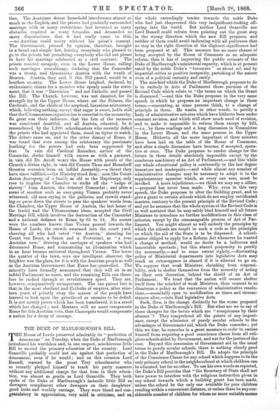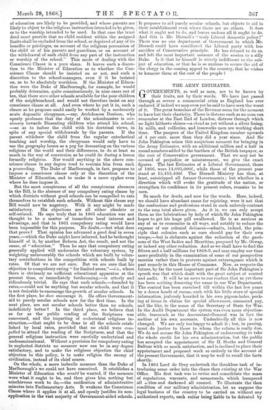THE DUKE OF MARLBOROUGH'S BILL.
THE House of Lords preserved admirably its " perfection of demeanour " on Tuesday, when the Duke of Marlborough introduced his worthless and, in one respect, mischievous little Bill to amend the primary education of the country. Lord Granville probably could not sin against that perfection of demeanour, even if he would ; and on this occasion Lord Russell, warned by the great Tory schoolmaster who so recently pledged himself to teach his party manners without any additional charge for that item in their educa- tion, was almost as gentle as Lord Granville. They both spoke of the Duke of Marlborough's imbecile little Bill as dowagers compliment other dowagers on their daughters' good looks and worldly carriage. They were bland and con- gratulatory in appreciation, very mild in criticism, and on the whole exceedingly tender towards the noble Duke who had just chaperoned this very insignificant-looking off- spring into the world. But neither Lord Granville nor Lord Russell could refrain from pointing out the great step in the wrong direction which the new Bill proposes, and neither of them could avoid indicating with all politeness that no step in the right direction of the slightest significance had been proposed at all. This measure has no more chance of being accepted by the House of Commons as an adequate reform, than it has of improving the public estimate of the- Duke of Marlborough's ministerial capacity, which is at present- rated by the noble Duke's " favourers " as about nil, and by impartial critics as positive incapacity, partaking of the nature- even of a political curiosity and rarity.
The mischief which the Duke of Marlborough proposes to do• is to embody in Acts of Parliament those portions of the Revised Code which relate to "the terms on which the Grant is dispensed,"—and this the Duke proposes in the very same- speech in which he proposes an important change in those- terms,—amounting, as some persons think, to a change of principle in them. He wants, in other words, to petrify a body of administrative minutes which have hitherto been under constant revision, and which still show much need of revision, and to make it impossible to reform them except by bill, —i.e., by three readings and a long discussion in Committee in the Lower House, and the same process in the Upper House. Hitherto, all the more important of these minutes. have been laid on the table of the House of Commons, and after a single discussion have become, if accepted, opera- tive at once. The Duke proposes to render change for the future in these details absolutely impossible except by the cumbrous machinery of an Act of Parliament, —and this while our whole educational policy is confessedly to the last degree immature and inadequate,—and while almost any number of administrative changes may be necessary to adapt it to the- supplementary agencies which, as every one sees, must be invoked. A more injudicious, we think we may say a sillier, —proposal ha's never been made. Why, even in this very speech, the Duke proposes to alter the building grant, and to. give a grant to certain schools which do not employ certificated masters, contrary to the present principle of the Revised Code ;. and yet he assumes that the whole system of the Revised Code is so well matured that he may safely bind himself and all future Ministers to introduce no further modifications in this class of minutes, except by the unmanageable process of Act of Par-• liament. You might almost as well embody the principles by- which the schools are taught in such a code as the principles on which the aid of the State is to be dispensed. A school- master obliged to apply for a Reform Act whenever he wanted a change of method, would no doubt be a ludicrous and lamentable spectacle ; but this absurd propensity to petrify the necessarily,—and to some extent rightly,—fluctuating policy of Ministerial departments into legislative Acts may reach an extravagance as absurd if it is allowed to go on.. We suppose that weak Ministers, shrinking from responsi- bility, seek to shelter themselves from the necessity of acting on their own discretion, behind the shield of an Act of Parliament. We trust that the nation will sooner shelter itself from the mischief of weak Ministers, than consent to so- disastrous a policy as the conversion of administrative resolu- tions,—essentially open to modification as times and circum- stances alter,—into final legislative Acts.
Such, then, is the change distinctly for the worse proposed in the Duke of Marlborough's Bill. But what are we to say of changes for the better which are " conspicuous by their absence "? They comprehend all the points of any import- ance, except the admission of purely secular schools to the advantages of Government aid, which the Duke concedes ; yet this, we fear, he concedes in a great measure in order to excuse himself from requiring a good conscience clause from all reli- gious schools aided by Government, and not for the justice of the- case. Beyond this concession of Government aid on the usual terms to purely secular schools, there is nothing clearly good in the Duke of Marlborough's Bill. He adopts the principle. of the Conscience Clause for any school which happens to be the only primary school in the neighbourhood at which children can be educated, but for no other. To use his own words as reported, the Duke's Bill provides that " the Secretary of State shall not have power to interfere with the religious instruction given in any school towards which a building grant has been made, unless the school be the only one available for poor children residing within a convenient distance, or unless there be any con- siderable number of children for whom no more suitable means. of education are likely to be provided, and whose parents are likely to object to the religious instruction intended to be given, or to the worship intended to be used. In that case the trust deed must provide that no child resident within the assigned limits shall be excluded from the school, or deprived of any of its benefits or privileges, on account of the religious persuasion of the child or of his parents and guardians, or on account of the withdrawal of such child from any part of the instruction or worship of the school." This mode of dealing with the Conscience Clause is a pure sham. It leaves such a discre- tion to the Minister of Education as to whether the Con- science Clause should be insisted on or not, and such a discretion to the school-managers, even if it be insisted on, as to be absolutely worthless. If the Minister of Educa- tion were the Duke of Marlborough, for example, he would probably determine, quite conscientiously, in nine cases out of ten, that there were other schools available for the poor children of the neighbourhood, and would not therefore insist on any conscience clause at all. And even where he put it in, such a clause as he proposes could easily be worked by a moderately acute dogmatic clergyman,—say, Archdeacon Denison, who openly professes that the duty of the schoolmaster is mis- sionary towards Dissenting children who attend his school, —so as to imbue the child with his doctrinal views, in spite of any special withdrawals by the parents. If the parent withdrew the child from the regular catechetical teaching and worship, the clergyman would only have to use the geography lesson as a peg for descanting on the various religions of the world and their differences, to do at least as much in the way of conversion as he could do during a lesson formally religious. Nor would anything in the above con- science clause in any degree tend to restrain him from such a proceeding. The Duke of Marlborough, in fact, proposes to impose a conscience clause only at the discretion of the Minister of Education, and to make it a mere cypher even where he does impose it.
But the most conspicuous of all the conspicuous absences in the Bill, is the absence of any compulsory rating clause by which districts without good schools can be compelled to rate themselves to establish such schools. Without this clause any Bill would now be nugatory. With it any might be made satisfactory. His objections are all either obsolete or self-refuted. He says truly that in 1861 education was not thought to be a matter of immediate local interest and advantage, and - that in 1861 compulsory rating would have been impossible for this purpose. No doubt,—but what does that prove ? That opinion has advanced a good deal in seven years,—which the Duke might have inferred, had he bethought himself of it, by another Reform Act, the result, and not the cause, of " education." Then he says that compulsory rating generally applied will undermine the voluntary system, by weighting unfavourably the schools which are built by volun- tary contributions in the competition with schools built by rates. Of that we are not sure. But we are sure that his objection to compulsory rating " for limited areas,"—i.e., where there is obviously no sufficient educational apparatus at the present time, or immediately forthcoming,—is utterly and ridiculously trivial. He says that such schools,—founded by rates,—could not be anything but secular schools, and that it is not desirable to encourage the growth of secular schools. In the first place, he does encourage it. He offers Government- aid to purely secular schools now for the first time. In the next place, are not secular schools better than no schools, indefinitely better ? In the third place, we believe that so far as the public reading of the Scriptures was concerned, and the imparting of undoctrinal religious in- struction,—that ought to be done in all the schools estab- lished by local rates, provided that no child were com- pelled to attend the reading of the Scriptures, and that the general religious instruction were carefully undoctrinal and undenominational. Without a provision for compulsory rating in neglected districts no measure now can be in any degree satisfactory, and to make the religious objection the chief objection to this policy, is to make religion the enemy of civilization, instead of its chief source.
On the whole, a more imbecile measure than the Duke of Marlborough's we could not have conceived. It establishes a Minister of Education who would be wanted, if the measure were what it ought to be, and then gives him nothing but mischievous work to do,—the ossification of administrative minutes into Parliamentary Acts. It weakens the Conscience Clause where it applies it at all, and openly justifies its non- application in the vast majority of Government-aided schools.
It proposes to aid purely secular schools, but objects to aid in their establishment even where there are no others. It does what it ought not to do, and leaves undone all it ought to do. And this is Mr. Disraeli's " truly Liberal domestic policy 1" There was no one department of Government in which Mr. Disraeli could have conciliated the Liberal party with less sacrifice of Conservative principle. He has refused to do so, and left the most important measure of the session to a silly Duke. Is it that he himself is utterly indifferent to the sub- ject of education, or that he is so anxious to secure the aid of the clergy in the coming appeal to the country, that he wishes to humour them at the cost of the people ?



































 Previous page
Previous page